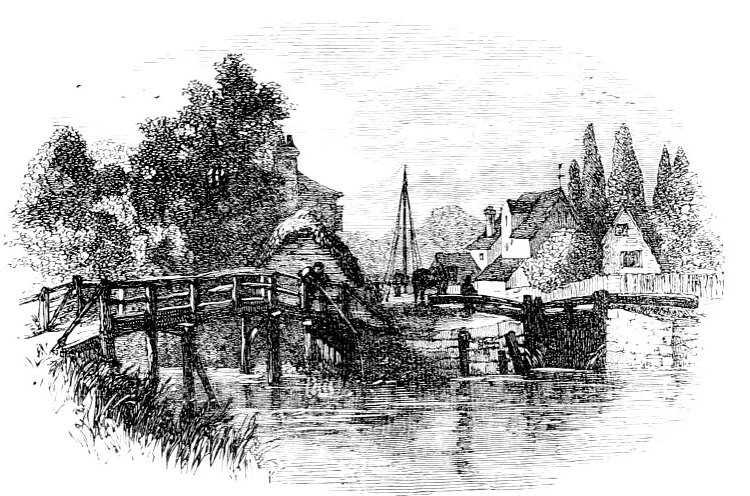The Thames is "the King of Island Rivers;" if deficient in the grander features of landscape, it is rich in pictorial beauty; its associations are closely linked with heroic men and glorious achievements; its antiquities are of the rarest and most instructive order; its natural productions of the highest interest; it wanders through fertile meads and beside pleasant banks, gathering strength from a thousand tributaries; on either side are remains of ancient grandeur, homely villages, retired cottages, palatial dwellings, and populous cities and towns; boats and barges, and the sea-craft of a hundred nations, indicate and enhance its wealth; numerous locks and bridges facilitate its navigation, and promote the traffic that gives it fame. Its history is that of England: the Britons, the Romans, the Saxons, the Danes, and the Normans, in turn made it their "seat of war," or, settling upon its banks, sought the repose of peace and the blessings of agriculture and commerce. In all the civil contests of centuries it obtained melancholy renown: the intrenched camp, the castle, the baronial hall, the mansion, the villa, occupied adjacent steeps, commanded fords, or adorned its sides, as harmony took the place of discord, and tranquillity succeeded strife. There is scarcely a mile of its borders which may not give birth to some happy thought in association with the past: abbeys, monasteries, and churches exhibit their remains, or rear "the tall spire," consecrated by use and age; the better parts of their structures having endured with the purer portions of the ancient faith. Sites and memorials of famous battles — king with baron, lord with serf, ancient owners of the soil with its invaders, those who warred for despotism or fought for liberty, for feudal rights or freedom; the cromlech of the Briton, the tumulus of the Koman, the barrow of the Saxon, the sculptured tomb of the knight, and the simple monument of the gentleman; — these are to be found, in numbers, on its banks. The names of very many of the great men of England — who "penned" or "uttered wisdom" — are nearly or remotely connected with this river: in its "fields beloved" their "careless childhood stray'd;" in its city of colleges, "for meditation apt," their youth gathered strength for the strife of manhood. To its banks full often came the soldier, the statesman, the scholar, and the poet, "after life's fitful fever," to seek that rest from labour which is labour's best recompence — to enjoy alike
"The solid pomp of prosperous days,
The peace and shelter of adversity."
Flowing through rich alluvial soil, that is never sterile, during the whole of its course it meets not an acre of unmanageable bog, and hardly a square yard that does not produce pasture or foliage, except where it refreshes and prospers active villages, busy towns, or crowded cities — venerable Oxford, regal Windsor, "mighty London," and a hundred places, wealthy and famous. It would be indeed impossible to over-estimate the value of the Thames to the British capital. It is said that when one of our sovereigns, angry with the chief magistrate of the metropolis, threatened to ruin it by removing the court, he received the memorable answer, "But your Majesty cannot remove the Thames!" — S.C. and A. Hall, The Book of the Thames from its Rise to its Fall
The River Thames from its source to Nore
- From its source to Windsor (I)
- From its source to Windsor (II)
- From Windsor to the Nore (I)
- From Windsor to the Nore (II)
- Detail (mouth of the Thames)
Oxford and its environs

- Oxford, from near Binsey
- Osney Lock
- Oxford Castle
- Christ Church Meadow
- Folly Bridge
- Junction of the Cherwell and the Thames
- Magdalen Tower from the Bridge
- The Thames near Oxford — Distant View of Abingdon Church
- Abingdon, church, and river
- The Thames near Oxford — Iffley Church
Other towns and cities
- The River Thames begins
- The Church and Village of Cotes
- Lechlade from the First Lock
- Rochester Castle
- Rochester Cathedral
- Sunbury
- Sonning
- Wallingford
- Walton Church

Related Material
Bibliography
Hall, Mr. and Mrs. S. C. The Book of the Thames from its Rise to its Fall. London: Arthur Hall, Virtue, and Cp., 1959. Internet Archive version of a copy in the William and Mary Darlington Memorial Libray, the University of Pittsburgh. Web. 16 April 2012.
London Past and Present. Ed. Malcolm C. Salaman. Text by Charles Holme. London: The Studio Ltd, 1916.
Last modified 17 April 2012